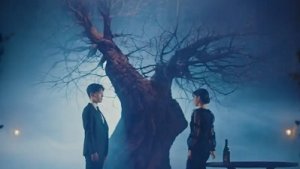
This review may contain spoilers
Beautiful yet bewildering
This show was always on my list of things to watch but continuously shelved in favour of something else. But then, having watched One Spring Night, I decided to finally give this a go.The show is divided into three parts: a very good beginning, an excellent middle but then a lacklustre ending that collapses in its own contradictions and frustrating character decisions. I enjoyed the budding romance between Jun-Hai and Jina-a and really liked the social commentary on why certain people are looked down upon. The growing conflict between Jina-a and her family regarding her personal life boils once they find out. On that front, the show does really well.
But it's problems are namely two things: lack of attention to different subplots that have little interaction with each other, and basically character stupidity. I'm going to focus on the latter first. I don't understand the hell Jina-a gets from everyone, especially her best friend who, only few episodes earlier witnessed Jina-a being sexually assaulted. There's a bewildering lack of empathy amongst the support characters for what Jina-a is enduring. But both Jun-hai and Jina-a are frustrating for acting like martys, paragons of suffering who just silently endure all abuse yet reprimand each other for these very same things. Jina-a's ex-boyfriend was a serial creep, yet Jina-a's method was to keep ignoring and enduring as his behaviour got worse. Her habit of keeping things a secret from Jun-hai, knowing he'd be annoyed, only to then apologise later sheepishly knowing he'd be too seduced to stay angry, these things didn't sit well. She has a tendency to allow conflicts to fester through her passivity, be it with her family, her best friend or even in the workplace.
Jun-hai is similarly frustrating in his inability to convey to his sister that he wants freedom to make his own choices, in his persistence in silently tolerating things knowing fully well this upsets Jina-a even more. I really didn't like the pressures he put on her regarding her housing problem. I loathed how he was in many ways crippling her independence.
The other thing the show suffers from is the lack of connectivity between different subplots, although perhaps it's intentional to show that no-one understands what Jina-a goes through. The workplace conflict was extremely interesting but it only ever got 10 or 15 minutes in any given episode and this just was never enough time.
I became really frustrated with the show towards the end. Both the lead characters simply are not likeable enough.
Was this review helpful to you?

A slow but worthwhile night in spring
I found this show very difficult to watch initially but persevered because of the upcoming Snowdrop show featuring the same male lead.The premise of this show is beautiful, and socially relevant by flipping the single parent stereotype. But it's a slow-burning show and the crawling pace of developments in the first few episodes really made it difficult for me to get into it. I gave up on the show before coming back and I'm glad I did because after episode 6 it gathered momentum. The pace of the show didn't change much but it had finally entered its meaningful stages of conflict where the storytelling and dialogue were rich in quality.
This show flourished from having excellent stories all round that didn't detract from the show's underlying message, but rather added it to it. This was a story of finding yourself, freeing yourself and doing right by escaping tormenting, abusive and painful relationships. Broken hearts and broken relationships lead to broken people. This show took on conservative norms and ideals and challenged them powerfully whilst being nuanced, empathetic and grittily realistic. There was a lot of beauty found in the small, meaningful dialogues where characters reassured and confided each other, and a lot of power in how they faced up to the reality of the truth regarding the state of their lives and their relationships. This show underlined that relationships do not exist solely on love but respect and reciprocity, and that abuse can be emotional and physical.
For that, I applaud it. It began slowly but it only got better and better with each episode and by the end was a fantastic watch.
Was this review helpful to you?
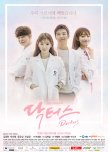
One very empathetic main characters - surrounded by a cast of shallow, cardboard bores
This is a show that was ruined by what it thought it ought to do rather than just being what it should have - which was a story of two very different women who compete against each other, come from radically different lives, yet are shaped and scarred by the misfortunes of their family upbringing.Instead this show gave us romantic plots that weren't necessary or interesting. Characters were shallow and never fleshed out beyond Hye-Jeong's character - who was a figure you could easily empathise with, portrayed very well by Park Shin-hye. She was a typical character of rough, hardened exterior barely concealing a broken and lonely soul too afraid of hope and happiness. Where the scenes centred on her and her trauma, the show was good. The problem was when it gave her a love triangle that was shallow and forced. At no point did I enjoy this. I despised Kim Rae-won's character, for how unethically he behaved as a teacher when he couldn't see the problems of his closeness to Hye-Jeong. I didn't like how he pursued her and I wasn't at all interested in his backstory.
The most interesting character besides Hye-Jeong was Jin Seo-Woo, portrayed by Lee Sung-Kyung. Her story arc of rich girl tormented by the burden of expectation and fear of failure was interesting and the show would have benefitted from dedicating more scenes to showing that there was more to her than just this resentful energy - the problem was that in not doing this, in making her jealousy towards Hye-Jeong seem so petty, vindictive and cruel, it made her fundamentally a very unlikeable character who you couldn't sympathise for even during her more distressed, human moments.
The show did not deliver, something i could tell would be the case just halfway into it. That says everything.
Was this review helpful to you?
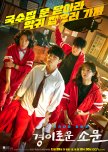
This review may contain spoilers
Easy to watch
I enjoyed this show from start to finish - this was a really good show. The story was engaging, as were the cast. I thought the acting was good and I like how even some of the side dramas all had endpoints far bigger than just being subplots. I was underwhelmed, badly, by the ending in how things were resolved. I felt like sometimes the show built up tension but the pay-off wasn't there. Kdrama shows often fall when it comes to specifically this, and Uncanny Counter was vulnerable to that as much as anything else.Was this review helpful to you?

This review may contain spoilers
A messy but enjoyable watch
The edifice upon which this show is built is a chaotic, disorganised and spiralling series of plot threads that often didn't receive enough attention to the point where the show should have suffered. And it did in the sense of I felt it could have been so much better. At times it was ridiculous how conflicts were invented randomly without any foreshadowing, and then clumsily resolved. But crazily, Fight For My Way somehow, insanely, made it work. The messiness of the story simply worked in enriching what was fantastic about this show - and that was the relationship between Ae-ra and Dongman. Their chemistry was superb and they genuinely imparted a feeling that we were watching two bickering, best friends realising that they were in love with each other.The romantic subplots sometimes diverted from what was really interesting about the show, made worse by how cleanly they were resolved without a hint of a mention later on. Ae-ra's early dating fling being a prime example of poor writing that somehow worked out all right. Where the show prospered was on combination of strong dialogue and terrific acting. Give me a bad plot and I'll still enjoy it if the characters and acting are good. This show embodied that oxymoronic trait that sometimes accompanies shows. It could have been better if it focused more on the two main character's backstories and career pursuits. Where it concerned Ae-ra, the show told a good story about class inequality and meritocracy, about the difference of an empty CV and one built on scrapping to survive. Ae-ra's plight told the modern story of the financial constraints on ambition, on how the need to financially survive outweighed career pursuits. This arc was ultimately a satisfying one, but could have been so much more.
I'm less convinced by how Sul-He and Joongman's relationship unfolded. I don't agree with the way it ended, or at least I usually wouldn't have. Not respecting your partner should come with a price. And yet, the authenticity of the dialogues and the sincerity of the acting convinced me that it wasn't so bad. Again, the show was really good at that.
I'm giving this show a low 8.5 because I think it was ultimately a very enjoyable show but it was derailed by messy storylines built for conflicts and progression of arcs.
Was this review helpful to you?
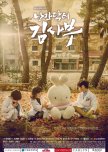
Surprisingly good
I don't usually watch hospital dramas and there were certainly moments here when I felt my decision was vindicated but overall I enjoyed this show's first season. The story of a small hospital in the outskirts of nowhere, rundown with minimal resources and nothing but dedicated doctors is one that will gradually win you over. The characters are all people to root for, though sometimes a little annoying, and the rising conflict in the show keeps you engaged right until the end. All in all, a good show.Was this review helpful to you?

Good but not great
This is an easy show to watch without ever hitting the heights of greatness. The lead duo are really good in their roles and deliver genuine performances. Their relationship is suitably sweet and awkward in the same mix. But the show doesn't go deep enough into some of the really promising angles it set up. It also creates needless conflicts that lack tension because the viewer can see the resolution from a mile away. At times it came across as a poor man's I'm Not a Robot and I don't mean this as a slight upon the cast who gave it their everything, but were undermined by some weak writing.Was this review helpful to you?
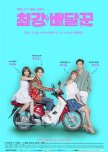
This review may contain spoilers
Let down badly by the ending
If there's one thing I don't like about shows, it's unravelling a character's primary motivations and goals with some weak storytelling. There was a tension built early into this story because of Chae Soo-bin's character having a dream that would put her at odds with anyone wanting to be in a relationship with her. The show had a potential to see it through and deliver something with a beautiful ending but instead concluded tamely. I really could not get my head wrapped around how easily the show got around this.Unfortunately the male lead was also very hard to like. I was glad he got a haircut but that barely improved my opinion of him. He went back on his word to Chae Soo-bin's character in terms of respecting her wishes and for the life of me, I cannot bear characters who have an everlasting capacity to suffer with dignity and honour. No-one behaves like this in real life without appearing like an ant beneath a boot. By the end it was hard to root for him.
To be honest, the premise of the show was interesting and offered an insight into the socioeconomic dynamics of how big power can be fought through collective organising. That was pretty cool. But that was about it.
Was this review helpful to you?
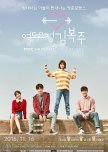
This review may contain spoilers
You'll power through this show happily
This is a rather fun show that had a lot of hype surrounding it and largely delivered. The acting was phenomenal and the story beautifully crafted a message about struggling through adversity imposed internally and externally, finding the new sense of willpower once you are mentally burned out.Lee Sung-Kyung was superb in her role and she carried this shoulder like a barbell made out of paper. Her character was endearing, flawed but always with a giant heart and she enjoyed a terrific chemistry with Nam Joo Hyuk's character. I would say however, the character who I was most interested by was Kyung Soo-Jin's character, Song Shi Ho. Her story of turmoil, hardship and quiet despair played out in front of others without anyone noticing a young woman crumbling under the pressures of her responsibilities. Her story was captivating, Kyung Soo-Jin's acting terrific, and though I felt the resolutions were a little too neat between her and some of the other characters, I was happy for her by the end. She really was fantastic.
I'm a little less enthusiastic about Nam Joo Hyuk's character, who though a main character himself, was really just a prop throughout for Kim Bok Joo. He was a swimmer who suffered from anxiety and yet this was rarely given the screen-time it deserved. There was also a family drama at the end that was written and concluded essentially over an episode or two when it deserved so much more. This show could have been an all-time kdrama great, at least for this decade, but barring the two lead female characters, the rest just weren't very interesting.
I would recommend this to everyone however. The story is still really engaging and some of the core elements that make a kdrama show great were there in abundance.
Was this review helpful to you?

Ran out of ideas by the end
This show was one to watch if you were invested in the characters and not the plot, which in itself was lacklustre and often created conflicts that were immediately resolved. There were important themes of learning about yourself and recognising your own importance, but there were also episodes that meandered on with convenient conflicts created by characters misunderstanding each other for no reason. There was no real sense of urgency or tension towards the end because ultimately, everything was wrapped up quite early. The focus of the story that would have captivated viewers was the relationship of the lead duo over any actual in-story developments. That becomes a problem when you run out of ways of tearing the couple apart just to bring them back together ten minutes later. The cute chemistry the lead duo had aside, this show really struggled for me at times.Was this review helpful to you?

Undeniably Good
This is a show that I had seen recommended on my Netflix list frequently so decided to finally give it a go. With Suzy in the show, I felt even if I didn't entirely enjoy it, she would always be a positive - and so she proved. Luckily, the show itself was more than good. This is an emotionally heavy show with an ending that you technically knew was coming but were still flattened by.The flashbacks are integral to this story and lay the scene for what the show is about. The events that led to the lead characters separating before finding their way back into each other's lives are something typical of a kdrama story in demonstrating how lead characters are sometimes connected prior to meeting on the show. There is a sense of loss and foreboding separation that accompanies the lead characters as they try to rebuild a damaged relationship while the lead male reckons with his guilt for his part in the events that cleaved them apart.
The story is a motif for what we do and suffer because of family. Each character's suffering is tied to what they experience due to their loved ones. Suzy's character is beautifully realistic in her pragmatism because all she wants now in life is the very best for her brother. We have to talk about Kim Woo-Bin's acting. He was the heart, soul, rage, pain and joy of this show. From the moment it became clear what was going on with him, and his part in Suzy's childhood, there was just this yearning to see him make peace with himself. His relationship with those closest to him shaped the sense of pain that drove the show and constantly brought you to sympathy for him even when he was doing his best to show he didn't deserve it.
Some of the other characters in the show were not well-written enough to stand out as support characters. The mother of Kim Woo-Bin's acting was both incredible and frustrating, and your viewpoint of characters like her and others might change with each rewatch. There was also one problem with the flashbacks in using the same actors for them which I won't spoil for anyone, but it made some of present-day scenes implausible.
The show's final episode and final scenes were very quiet and that worked better than a spectacular, grandstand finish. Sometimes, what love relationships deserve aren't these massive gestures and fireworks but the beautiful quietness and simplicity done well. The show ended in a way that will leave you close to tears, and some might object to how it was written, but I think it worked for the best.
Overall, it's a great show!
Was this review helpful to you?

Because this is worth rewatching!
Compared to some of the other kdrama shows I had watched, the synopsis for this one seemed less spectacular and more grounded in the comedy of everyday life. There was something relatable in watching characters navigate through life as tenants working low-pay jobs whilst struggling in relationships. The story quickly grows on you because the lead actors take the show and run with it. Their acting injects the story with sincerity, warmth, unintentional humour and at times, heartbreaking realism. This is a beautiful story of a person who loved before and had his heart broken so became emotionally sealed off and someone who has only ever experienced love and romance in books and TV screens, but never in real life. The beautiful awkwardness of the pair, coupled with some great music, made for a really enjoyable show that had some incredible scenes. There are some really standout moments of great acting that elevate scenes and entire episodes. The show is fairly predictable but that's all right because the plot matters less than the characters.The other thing I like about this show is that the support cast are also given a lot of screentime for their storylines. They are not merely props for the lead characters but real, independent human beings with their own conflicts - the show does really well to resolve these storylines without ever rushing them. In particular, the friendship of the three main women, mostly over chicken and beer, stuck with me.
Without giving away too much, the show was let down by the last two episodes. They weren't bad, but there were questionable character moments that seemed like they had been done simply to justify two further episodes.
This is a really good show, one that I enjoyed a lot and would definitely recommend to anyone.
Was this review helpful to you?
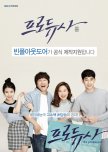
Watch it for IU's character
I watched this show because it had IU in it and unsurprisingly her character Cindy was the highlight. The best moments of character conflicts, acting, you name it, all came when they involved her. There was a quiet melancholy to her acting as though her character had accepted her fate in this world as someone unloved personally. IU really shone through in these more serious moments with a gentle yet undeniably sombre tone that spoke of a character who was never allowed to live a normal life. Seeing what happened to her character throughout and right up until the end wasn't easy to watch.The problem for the show is that this was really the only good thing about it. The other characters were simply not interesting enough. Kim Soo-Hyun is a terrific actor but there was something flat, gormless and unappealing about his character. He just wasn't interesting in the slightest. The show had a lot of promise but quickly petered out, and it's not memorable enough bar the moments that had IU in them.
Was this review helpful to you?

